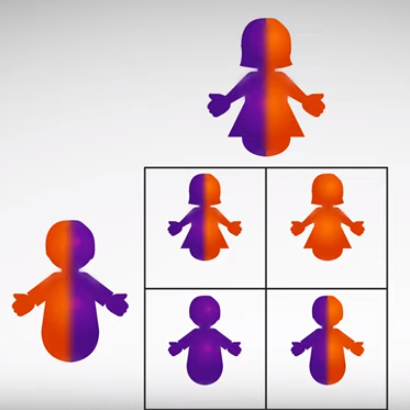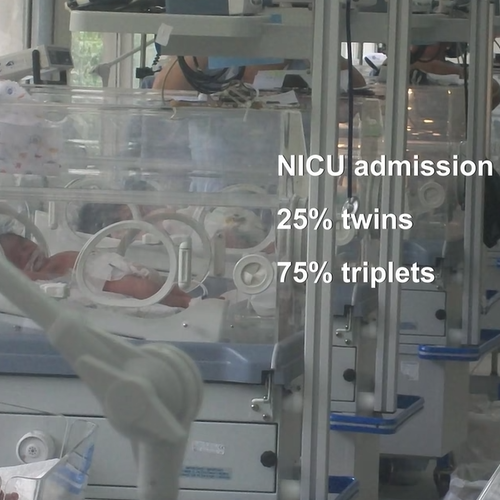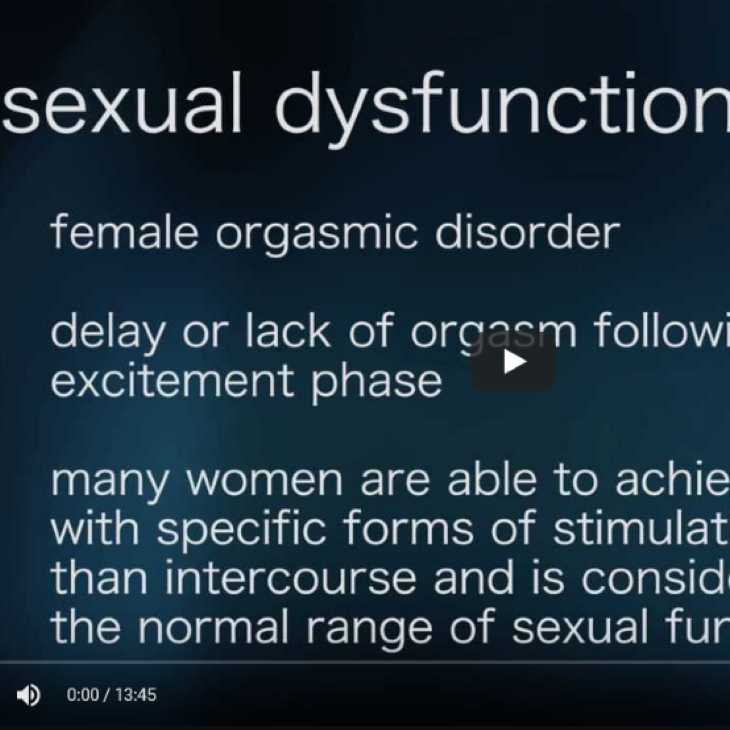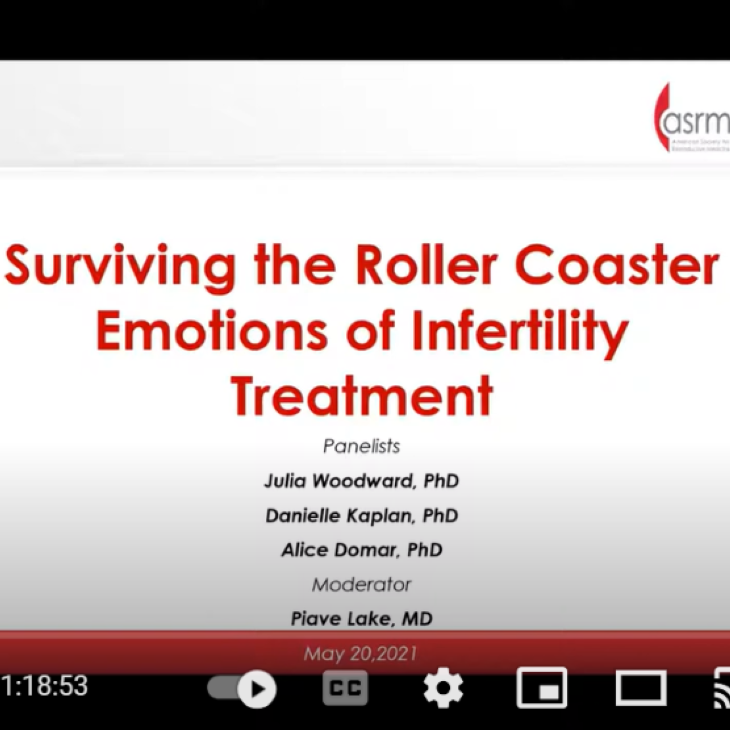Coping With Infertility
Transcript
Dr. Roger Lobo of the American Society for Reproductive Medicine discusses various methods of coping with infertility.
Hi, I'm Dr. Roger Lobo with the American Society for Reproductive Medicine. Today we're talking about coping with infertility.
Although assisted reproductive technology procedures are often successful they are not without difficulties. Psychological stress is common. It also takes a heavy toll on your finances and emotions. Some couples describe the experience as an emotional rollercoaster.
Anybody else that I have ever talked to who's considering IVF, I always tell them that it's important to have a good support system. Whether it be participating in an online support group, through community chats, or baby blogs - there's a wide network of infertility blogs that provide excellent support, which I would have never been able to live without. But if you're going to go through IVF you need the support. You need the emotional support. And you need to know that it won't be easy but you'll get through it. And there are people out there who will stand by you and help you through the process.
Because of the medications, careful monitoring during an IVF cycle with hormone testing and ultrasound, as well as laboratory expertise required, IVF is an expensive procedure. Nationally IVF costs several thousand dollars for each cycle.
Success rates vary and depend on many factors, including a woman's age, her ability to produce eggs, and the ability of her partner's sperm to fertilize her eggs. Patients have high expectations yet failure is common in any given cycle. Couples may feel frustrated, angry, isolated, and resentful. At times frustration can lead to depression and feelings of low self-esteem, especially in the immediate period following a failed ART attempt. The support of friends and family members is very important at this time.
Don't be embarrassed by the situation because a lot of people do feel like failures and they undergo a certain amount of embarrassment. Talk to people about it. Open up to people about it and you'll be surprised at the number of people that have undergone the same thing.
Couples are encouraged to consider psychological counseling as an additional means of support and stress management. Many programs have a mental health professional on staff to help couples deal with the grief, tension, or anxieties associated with infertility and its treatment.
Studies indicate that the chance for pregnancy in consecutive IVF cycles remains similar in up to six cycles. However, many other factors should be considered when determining the appropriate endpoint in therapy, including financial and psychological reserves. Members of the IVF team can help couples decide when to stop treatment and discuss other options such as egg and/or sperm donation or adoption if appropriate.
The physicians, support groups, and other couples undergoing infertility treatment can provide valuable support and guidance. To learn more check out our other videos on fertility or visit www.ReproductiveFacts.org
Videos
Resources For You
Infertility
SART Fertility Experts - Military Families and Fertility
Active-duty individuals in the military sometimes face unique circumstances when seeking fertility care. Learn more with a former military fertility physician. Listen to the EpisodeSART Fertility Experts - Q&A on Infertility
Infertility can create many questions for a patient. Listen to common questions and answers about infertility, egg freezing, and genetic testing. Listen to the EpisodeFertility Care Gets Important Win in California
ASRM celebrates California's SB 729, expanding IVF coverage for same-sex couples and singles, advancing equitable fertility care access.
View the Press ReleaseNational Infertility Awareness Week
April 20-26, 2025, is National Infertility Awareness Week (NIAW)!
View the NIAW ToolkitASRM announces support for HOPE with Fertility Services Act
The American Society for Reproductive Medicine is proud to endorse the HOPE with Fertility Services Act (HR 8821).
View the Press ReleaseSART Fertility Experts - Environmental Impacts on Fertility
In this episode, the fertility experts discuss the impact of the environment, including air, climate, and chemical exposures on infertility. Listen to the EpisodeSurvey shows strong support for increased access to fertility treatments
A new public opinion poll reveals strong support for improved access to In Vitro Fertilization (IVF).
View the Press ReleaseSART Fertility Experts - Recurrent Pregnancy Loss and Implantation Failure
"I can get pregnant, but I can't stay pregnant," is echoed by patients with recurrent pregnancy loss. Listen to the EpisodeSART Fertility Experts - Wellness and Fertility: Diet, Sleep and Exercise
Drs. Timothy Hickman and Rashmi Kudesia discuss the links between lifestyle and fertility. Listen to the EpisodeSART Fertility Experts - Navigating IVF as a Couple
Mary Casey Jacob, PhD is interviewed by Dr. Daniel Grow, and together they explore the emotional and practical support that couples need. Listen to the EpisodeMale Fertility Journey
About 20% of infertility cases are due to a male factor alone. Another 30% involves both male and female factors.
View the Patient JourneyFemale Fertility Journey
If you've been trying to get pregnant for more than a year, you may have infertility. Infertility is a disease of the reproductive system that impairs one of the body's most basic functions: the conception of children.
View the Patient JourneyStress and infertility
It is not clear how exactly stress impacts fertility. Read the Fact SheetHyperprolactinemia (High Prolactin Levels)
Prolactin is a hormone produced by your pituitary gland which sits at the bottom of the brain. Read the fact sheetOptimizing Natural Fertility
Before attempting pregnancy, a woman should make sure she is healthy enough for pregnancy by adopting a healthier lifestyle and taking prenatal vitamins. If she has a medical or genetic condition or risk of one, she should seek advice from a medical professional before conceiving (becoming pregnant) View the fact sheetOptimizing Male Fertility
About 20% of infertility cases are due to a male factor alone. Another 30% involves both male and female factors. View the fact sheetDefining Infertility
Infertility is “the inability to conceive after 12 months of unprotected intercourse.” View the Fact SheetFertility Rights and Responsibilities
Can a fertility program or clinic deny treatment to patient(s) if there is concern about the ability to care for the child(ren)? Yes. Fertility programs can withhold services if there are signs that patients will not be able to care for child(ren). View this Fact SheetMale Fertility Evaluation: What do I need to know?
Infertility is the inability to achieve pregnancy after one year of unprotected sex. View the fact sheetSmoking and infertility
Most people understand that smoking increases the risk for heart, vascular, and lung disease. View the fact sheetWhat are fibroids?
Uterine fibroids (also called myomas or leiomyomas) are benign (noncancerous) tumors of muscle tissue found in the uterus. View the fact sheetInfertility Counseling and Support: When and Where to Find It
Infertility is a medical condition that touches all aspects of your life. View the fact sheetWhat is In Vitro Maturation (IVM)?
In vitro maturation (IVM) is when a woman’s eggs are collected and matured outside the body. This is done as part of an in vitro fertilization (IVF) procedure. View the fact sheetSART Fertility Experts - Endometriosis
Endometriosis is a condition that can affect many facets of a person’s life, from pelvic pain to struggles with infertility. Listen to the EpisodeSART Fertility Experts - Recurrent Pregnancy Loss
Candace discusses her experience with infertility, IVF, multiple pregnancy losses and ultimately a successful delivery with Dr. Julia Woodward.Listen to the Episode
SART Fertility Experts - Financial Aspects of Infertility Treatment
“I know what treatment I want and need to do, but how can I afford it?” This is a common question infertility patients often ask themselves. Listen to the EpisodeSART Fertility Experts - Infertility Advocacy and Government Affairs
In today's episode, Dr. Mark Trolice interviews Sean Tipton about the fact that many infertility patients do not have insurance coverage for treatment. Listen to the EpisodeSART Fertility Experts - Your Infertility Nurse: Partner in Your Care
Infertility nurse practitioner and health coach Monica Moore explains the essential role of the infertility nurse in the IVF process. Listen to the EpisodeIntracytoplasmic sperm injection (ICSI)
A procedure called intracytoplasmic sperm injection (ICSI) can be done along with in vitro fertilization (IVF) if a sperm cannot penetrate the outer layer of an egg. Read the Fact SheetSART Fertility Experts - IVF: Cycles of Hope and Heartbreak
Does stress cause infertility or is it the other way round? Listen to the EpisodeSART Fertility Experts - RESOLVE and Infertility
Due to the unique stress of infertility, patients often look for resources and support in addition to those provided by their medical provider. Listen to the EpisodeWhat is Recurrent Pregnancy Loss (RPL)?
This is a condition when a woman has 2 or more clinical pregnancy losses (miscarriages) before the pregnancies reach 20 weeks. View the fact sheetWhat is Premature Ovarian Insufficiency (Previously Called Premature Ovarian Failure)?
When a woman’s ovaries stop working before age 40, she is said to have premature ovarian insufficiency (POI). View the fact sheetTestosterone use and male infertility
Testosterone (also referred to as “T”) is a hormone produced in men by the testes (testicles). View the fact sheetSART Fertility Experts - Safe Surfing: The Pros and Perils of Social Media
Dr. Kenan Omurtag, MD joins host Dr. Mark Trolice to discuss the use of social media in the field of infertility. Listen to the EpisodeSART Fertility Experts - What is an REI?
These experts in infertility lead IVF programs, perform reproductive surgery, and perform research to enhance the field of reproductive medicine. Listen to the EpisodeStress and Infertility
Medical procedures, cost, outcome uncertainty, and unwanted or unhelpful advice from friends and family are stressors associated with infertility treatment. Watch VideoInfertility: an Overview (booklet)
Infertility is typically defined as the inability to achieve pregnancy after one year of unprotected intercourse. View the bookletMale Fertility and Infertility - a patient education video
Male Factor Infertility is responsible for about 30% of infertility cases and can contribute infertility to an additional 20% of cases. Watch VideoInfertility
Infertility is the result of a disease (an interruption, cessation, or disorder of body functions, systems, or organs) of the male or female reproductive tract which prevents the conception of a child or the ability to carry a pregnancy to delivery. Watch VideoBasic Infertility Evaluation
Dr. Roger Lobo of the American Society for Reproductive Medicine discusses the various methods to evaluate infertility. Watch VideoFibroid Tumors
An educational video that answers patient questions about the causes, symptoms, diagnosis and management of uterine fibroids. Watch VideoInfertility Treatments
Dr. Roger Lobo of the American Society for Reproductive Medicine discusses the various treatments for infertility. Watch VideoUnderstanding Fertility
In this video series, Dr. Roger Lobo explains the basics of infertility, including causes, treatments and coping methods. Watch VideoSurviving the Roller Coaster Emotions of Infertility Treatment
The experience of infertility is a rollercoaster of hope and disappointment. Treatment presents an opportunity for hope as well as a new set of challenges. Watch VideoAcupuncture and Infertility Treatment
Acupuncture is an alternative medical treatment that involves placing very thin needles at different points on the body. View the Fact SheetSexual dysfunction and infertility
Sexual dysfunction is a problem in a person’s sexual desire, arousal, or orgasm. View the fact sheetCoping With Infertility
Dr. Roger Lobo of the American Society for Reproductive Medicine discusses various methods of coping with infertility. Watch VideoEndometriosis
Endometriosis is a condition in which endometrial tissue, which normally lines the uterus, develops outside of the uterine cavity in abnormal locations. Watch VideoCauses of Female Infertility
Dr. Roger Lobo, of the American Society for Reproductive Medicine explains the causes of female infertility. Watch VideoAge and Fertility (booklet)
Generally, reproductive potential decreases as women get older, and fertility can be expected to end 5 to 10 years before menopause. View the BookletCauses of Male Infertility
Dr. Roger Lobo, of the American Society for Reproductive Medicine explains the causes of male infertility. Watch VideoFAQ About Infertility
Infertility is not an inconvenience; it's a disease of the reproductive system that impairs the body's ability to perform the basic function of reproduction. Learn the factsFAQ About the Psychological Component of Infertility
Infertility often creates one of the most distressing life crises that a couple has ever experienced together. Learn the factsMary Dolan's Story
Infertility Infographics
ASRM has prepared infographics to illustrate the subject of Infertility better. View the infographicsPsychological Counseling
SART Fertility Experts - Recurrent Pregnancy Loss and Implantation Failure
"I can get pregnant, but I can't stay pregnant," is echoed by patients with recurrent pregnancy loss. Listen to the EpisodeStress and infertility
It is not clear how exactly stress impacts fertility. Read the Fact SheetSART Fertility Experts - Recurrent Pregnancy Loss
Candace discusses her experience with infertility, IVF, multiple pregnancy losses and ultimately a successful delivery with Dr. Julia Woodward.Listen to the Episode
SART Fertility Experts - IVF: Cycles of Hope and Heartbreak
Does stress cause infertility or is it the other way round? Listen to the EpisodeStress and Infertility
Medical procedures, cost, outcome uncertainty, and unwanted or unhelpful advice from friends and family are stressors associated with infertility treatment. Watch VideoInfertility: an Overview (booklet)
Infertility is typically defined as the inability to achieve pregnancy after one year of unprotected intercourse. View the bookletSurviving the Roller Coaster Emotions of Infertility Treatment
The experience of infertility is a rollercoaster of hope and disappointment. Treatment presents an opportunity for hope as well as a new set of challenges. Watch VideoCoping With Infertility
Dr. Roger Lobo of the American Society for Reproductive Medicine discusses various methods of coping with infertility. Watch VideoFAQ About the Psychological Component of Infertility
Infertility often creates one of the most distressing life crises that a couple has ever experienced together. Learn the factsFind a Health Professional


































